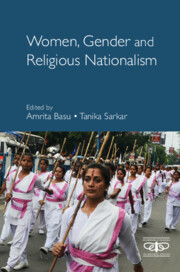Book contents
- Frontmatter
- Dedication
- Contents
- List of Abbreviations
- Introduction: Women of Hindu Rashtra
- Part I Changing Modalities of Hindu Nationalist Organizing
- Part II Gendered Techniques of Mobilization: The Sangh and the Samiti
- Part III Cultivating Women’s Militancy: The Vishva Hindu Parishad
- Part IV Refashioning Gender and Sexuality
- Part V Alternative Activist Responses to the Hindu Right
- Glossary
- About the Contributors
- Index
1 - Right-Wing Women’s Mobilization: Notes from Colonial Western India
Published online by Cambridge University Press: 12 August 2022
- Frontmatter
- Dedication
- Contents
- List of Abbreviations
- Introduction: Women of Hindu Rashtra
- Part I Changing Modalities of Hindu Nationalist Organizing
- Part II Gendered Techniques of Mobilization: The Sangh and the Samiti
- Part III Cultivating Women’s Militancy: The Vishva Hindu Parishad
- Part IV Refashioning Gender and Sexuality
- Part V Alternative Activist Responses to the Hindu Right
- Glossary
- About the Contributors
- Index
Summary
In early 2019, a short video clip of Pooja Shakun Pandey, a senior woman functionary of the Akhil Bharat Hindu Mahasabha (All India Hindu Grand-Assembly, henceforth ABHM), shooting an effigy of Mahatma Gandhi went viral (First Post 2019). The clip flaunted the violent militancy of a party woman. The recreation of the assassination, conducted at a local party office in Aligarh, was widely reported in national dailies (Barman 2019). Controversially, overt celebrations of Gandhi's murder have become commonplace in the last few years, and the ABHM, as is well known, was actually implicated in the murder conspiracy. Pushed into insignificance since the 1950s, the ABHM has, however, dramatically resurfaced in the last decade or so alongside the political ascendancy and electoral success of the Bharatiya Janata Party (BJP). It is expanding its state-level chapters as well as front organizations among students, youth, ascetics and women. Strikingly, all its office-bearers at the central organizational level and in the working committee are upper-caste men.
The ‘public’ presence of militant women like Pooja Shakun Pandey intrigues academics about the appeal of right-wing political movements and parties for women: a significant question because these forces are otherwise markedly conservative about gender. What is the political trajectory of women in such parties? Why do we know so little about the foremothers, as it were, of women like Pandey? Though some work has been done on women of the Sangh Parivar, the lineages of Pandey in the Mahasabha are far less familiar. Feminist scholar Andrea Peto, who has researched the lives of fascist women in countries of the former Soviet Bloc, argues that one of the main challenges for scholars working on the biographies of such women is that of reconceptualizing a key theme in feminist research: gender and power (Peto 2009). Women can actually manipulate their subordinate positions to become political agents (ibid.). Scholars of fascism recognize that women craft their own agendas and gain some leverage within fascist movements and regimes, although male fascists may continue to consider their work as secondary (Passmore 2002: 130). A recognition of women as accomplices and active participants in right-wing movements leads one to think hard about their politicization and nature of participation in these movements. Indeed, prospographical research can help map ‘ordinary’ women participants and develop a more individualized picture (Peto 2009).
- Type
- Chapter
- Information
- Women, Gender and Religious Nationalism , pp. 27 - 51Publisher: Cambridge University PressPrint publication year: 2022



